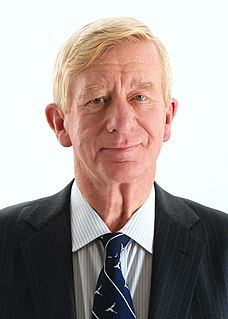A Quote by William Weld
We speak for all citizens of the Commonwealth when we say that society can draw great hope for the future because of the example which these young people are giving by their creative and constructive responses to the challenges which confront our communities and dedication to help those most in need.
Related Quotes
I would like to call on young people to commit themselves to activities that contribute toward achieving their long-term dreams. They have the energy and creativity to shape a sustainable future. To the young people I say, you are a gift to your communities and indeed the world. You are our hope and our future.
I believe that it is truly important for everyone to confront in dialogue the historical reality of the Reformation, its consequences and the responses it elicited. Catholics and Lutherans can ask forgiveness for the harm they have caused one another and for their offenses committed in the sight of God. Together we can rejoice in the longing for unity which the Lord has awakened in our hearts, and which makes us look with hope to the future.
The secret message communicated to most young people today by the society around them is that they are not needed, that the society will run itself quite nicely until they - at some distant point in the future - will take over the reigns. Yet the fact is that the society is not running itself nicely... because the rest of us need all the energy, brains, imagination and talent that young people can bring to bear down on our difficulties. For society to attempt to solve its desperate problems without the full participation of even very young people is imbecile.
When I was in Wuhan, I went to the art school, which was one of the most important art schools in China, an enormous art school. One of the things that I saw is that the schools are very big and there are so many students. It is very difficult to me to teach creative activity to great numbers of people, because I think you need personal contact with students, you need to speak individually, you need individual contact between teachers and students, you need continuity. To me this is a problem in mass education in every society now.
What we try to do as Elders is help those who are trying to change their own societies and communities for the better. We hope that by supporting the good work that is being done, especially at the grass roots, we can help to alleviate the suffering of human beings. That is our core mission - to draw attention to the impact that conflict, injustice and poverty have on ordinary people.
I've met dedicated people from all sectors of society who are committed to giving children the tools they need for a better future. I'm always impressed by the passionate young leaders I meet. As the pace of change accelerates, so do the challenges we face. However, the chances to solve them increase too.
We too need to protect, guide, and encourage our young people, helping them to build a society worthy of their great spiritual and cultural heritage. Specifically, we need to see each child as a gift to be welcomed, cherished, and protected. And we need to care for our young people, not allowing them to be robbed of hope and condemned to life on the streets.
We need a more holistic approach in which we take account of society's most vulnerable sectors. We shouldn't just do broad averaging of country statistics but rather we need to disaggregate the data to determine where the resources are most needed. In most cases, it's usually the reverse: those who are most marginalized - minorities and rural and remote communities - get the least attention and money.
Human beings need community. If there are no communities available for constructive ends, there will be destructive, murderous communities... Only the social sector, that is, the nongovernmental, nonprofit organization, can create what we now need, communities for citizens... What the dawning 21st century needs above all is equally explosive growth of the nonprofit social sector in building communities in the newly dominant social environment, the city.
As a great democratic society, we have a special responsibility to the arts. For art is the great democrat, calling forth creative genius from every sector of society, disregarding race or religion or wealth or color. What freedom alone can bring is the liberation of the human mind and a spirit which finds its greatest flowering in the free society. I see of little more importance to the future of our country and our civilization than the full recognition of the place of the artist.
The Muslim contribution to the future of America is to not only speak out as Muslims, but to also speak out as citizens in the name of our common values. Our main contribution is to reconcile the American society with its own values, those that are not in contradiction to Islam. We have a duty of consistency.
































